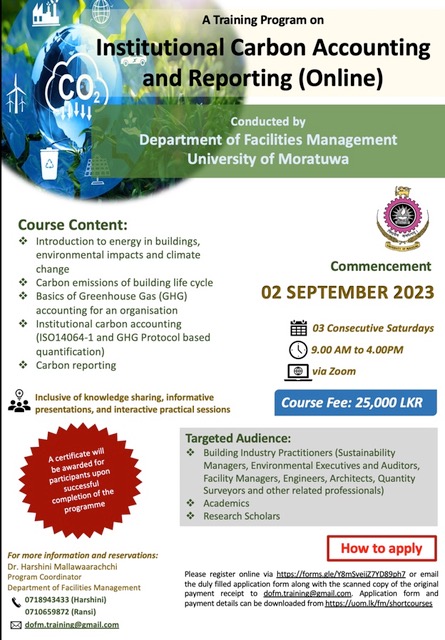Background
Most of that energy is derived from burning fossil fuels, which release greenhouse gases (GHGs), such as carbon dioxide (CO2), into the atmosphere. Current consumption of fossil fuels releases more than 25 billion tons of CO2 into the atmosphere every year. As an answer to the need of reducing greenhouse gas emissions, organisations are increasingly making efforts to account for their carbon footprint. Further, assessing carbon emissions accurately at the organisation level has become one of the most important aspects in reducing emissions and their impact as well as in reporting sustainable business practices. This program aimed at assisting organisations and individuals, such as research scholars, academics and building industry professionals to understand and perform carbon footprint assessment at the institutional level.
Program Objectives
To enable participants to;
- Acquire knowledge about basic carbon accounting and reporting principles
- Assess carbon emissions of an organisation based on SO14064-1 and GHG Protocol-based standardised procedures
- Apply carbon accounting and reporting principles for practical industry scenarios
Commencement and Course Duration
Date of commencement: 08th July 2023
Duration: 03 Consecutive Saturdays
Time: 9.00AM to 4.00PM
Course Content
- Introduction to energy in buildings, environmental impacts and climate change
- Carbon emissions of building life cycle
- Basics of Greenhouse Gas (GHG) accounting for an organisation
- Institutional carbon accounting
- Setting organisational and operational boundaries
- Identifying direct and indirect carbon emissions
- Tracking and calculating carbon emissions
- Accounting for carbon reductions
- Setting carbon reduction targets
- ISO14064-1 and GHG Protocol based standardised quantification tools and procedures
- Reporting carbon emissions
- Reporting for compliance
- Reporting principles
- Reporting carbon reductions
- Preparing GHG inventory report
Targeted Group
- Building Industry Practitioners (Sustainability Managers, Environmental Executives and Auditors, Facility Managers, Engineers, Architects, Quantity Surveyors and other related professionals)
- Academics
- Research Scholars
Completion and Certificate
Upon successful completion of the training program, a certificate will be awarded for participation. To be eligible for receiving the certificate, attendance is compulsory for all three days.
Course Fee
The total fee for the training program will be 25,000 LKR per person inclusive of course materials.
How to Enrol?
Registration can be done online via https://forms.gle/Y8mSveijZ7YD89ph7 or email the duly filled application form along with the scanned copy of the original payment receipt to dofm.training@gmail.com.
The course fee of LKR. 25,000/= per person should be paid on or before 30th of June 2023, and send the payment slip along with the duly filled application form to the Program Coordinator via dofm.training@gmail.com or through the online registration link. Payments must be drawn in favour of the University of Moratuwa and, the name of the training program: “Training Program on Institutional Carbon Accounting and Reporting – 2023” should be clearly mentioned on the bank transfer/deposit slip for easy reference.
Payment shall be made to;
Account No : 70993353
Account Name : University of Moratuwa
Bank : Bank of Ceylon
Branch : Katubedda Campus Branch
The placement will be reserved upon completion of registration by paying full course fees. Hence the prospective participants are kindly requested to submit the application form as early as possible and enrol without delay.
Application form – Word
For online registration: https://forms.gle/Y8mSveijZ7YD89ph7
For more information and reservations:
Dr. Harshini Mallawaarachchi
Program Coordinator
Department of Facilities Management
University of Moratuwa
Contact: 0718943433 (Harshini), 0710659872 (Ransi)
E mail: dofm.training@gmail.com

